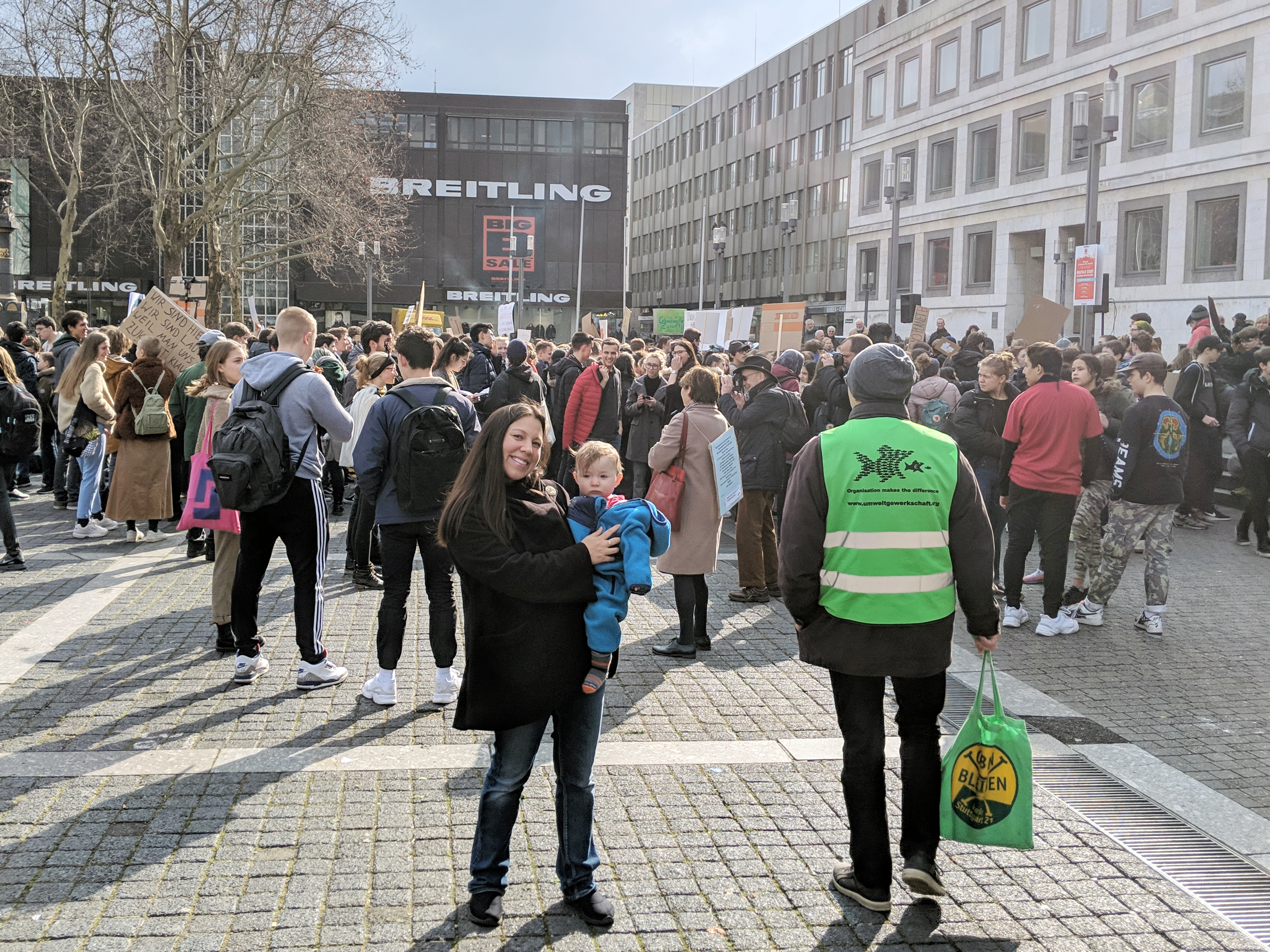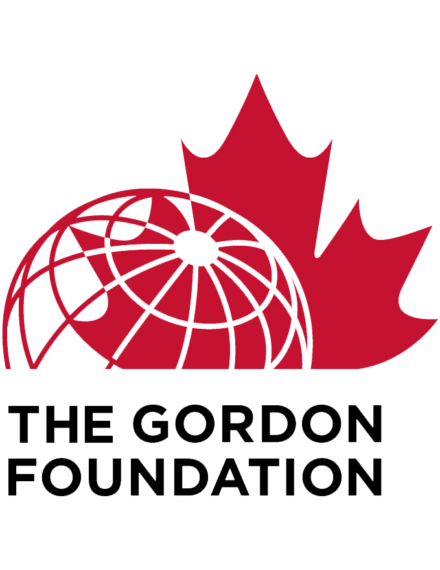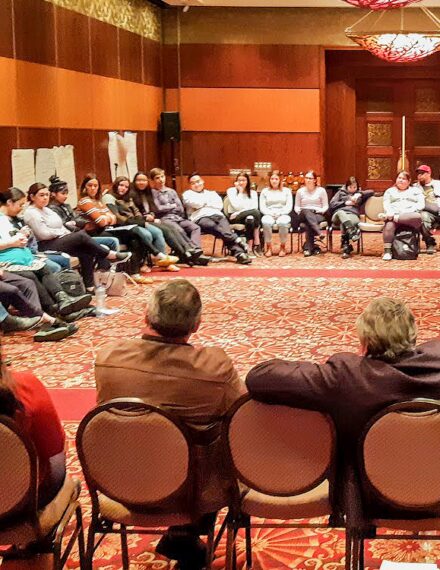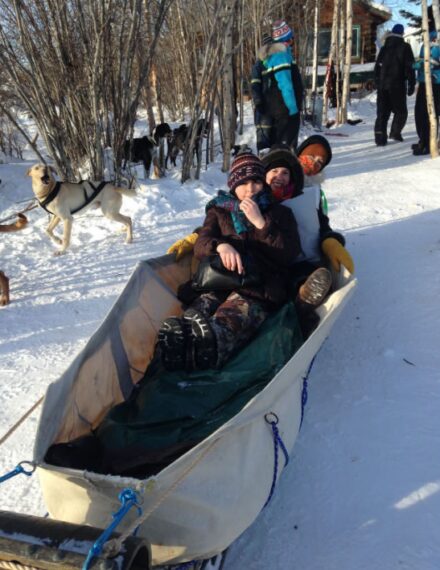
Jocelyn Joe-Strack is a Champagne and Aishihik First Nations scientist. During February 2019, she embarked on a speaking tour of Canadian embassies in Europe to sharing her Indigenous perspective on Climate Change with senior diplomats, academics, youth and the public. She is a 2012 Alumna of the Jane Glassco Northern Fellowship program.
Throughout this journey I have met many people. I have heard varying perspectives about the current, societal conundrum of how to advance civilization while also safeguarding Earth. But no group has impacted my truth more than my time with German youth.
On Friday February 22nd I marched for #FridayforFuture in Stuttgart, Germany. I stood with the youth, but overall, I was there to hold them up and support them. What power hope and belief – I was emotional. My reaction surprised me. I wouldn’t have expected tears while listening to passion expressed in German. My emotions signalled the importance of that experience, even if I couldn’t fully understand it then right then.

Standing with the Youth in Stuttgart, Germany #FridayforFuture
Youth throughout Europe, and now across the world, have been skipping school on Fridays to demand action towards climate change. They’re inspired by Greta Thunberg – the young woman from Stockholm who has sparked a movement urging governments to better commit to addressing climate change. Her speeches are direct and truthful. Young people are questioning why they’re studying if there is no future to study for? Why become educated if politicians are not listening to the educated?
The following Tuesday, I was given the great privilege of an hour and a half with 80, Grade 11 students from Berlin. I started by sharing about the Yukon, my people and the purpose of my journey to Europe.
I then gave them an hour to sew a small bag for someone they love. The outcome was indescribable. Every student made a bag. I brought moose hide and abalone buttons from the Yukon and each student used them differently. They made wallets, flute cases, bags for moms, sisters, fathers, boyfriends and grandparents.
Their teachers asked: “Why is Jocelyn asking you to do something with your hands as a way to combat climate change?” At first, I was concerned their teachers thought I was giving them an arts and craft hour, not a life lesson. But the lesson was fulfillment from creativity, productivity and love.
As they worked, we passed the microphone and they shared sentiments along the lines of:
- This is an entirely new perspective on climate change; I never thought about how my actions as an individual can help reduce impact on Earth;
- It’s good to spend time around a table with my friends without our cellphones;
- My mom will be amazed I made this;
- It’s interesting to think about how climate change is more than a science problem – it’s a people problem.
They completely understood what I was doing. I was beaming the entire time.

Berlin Grade 11 students creating bags for someone they love and learning the lessons of our Ancestors – productivity and fulfillment can rebalance our care for Earth and reduce our contribution to climate change.
I modelled the lesson after my peoples’ coming of age ceremonies, where a young girl, upon her first moon, spends one to four weeks isolated in a small tent. Her family brings her all their sewing – and she sews and sews. Her mother, aunts and grandmothers visit, tell stories and bring food. Finally, she returns to a potlatch celebrating her transition to womanhood.
This lesson was my way of giving the German students time to recognize that their capacity as a human goes far beyond their ability to make money. There is a great advantage to be had by doing something yourself, instead of trading for money. It allows fulfillment, productivity, creativity and self-worth. Giving a bag you made is far more meaningful than anything you can buy, because that small felt bag holds a bit of your being and your love.
Even the boys put hearts (literally little felt hearts) onto their sewing for their moms. It was all incredibly touching. Most had never sewn before; yet they all did it.
I smile thinking about them gifting their creations. I feel I gave them more than any lecture about a Yukon First Nations’ hardship with climate change ever could have. It was a lesson from our ancestors, that life can be more, you can confront climate change by demanding a better life than what society dictates.
Our civilization drives climate change and Earth’s hurt by educating our children to serve our society by entering the workforce as emailers and knowledge producers. They are taught that the only way to confront climate change is to become a scientist or politician.
I am a scientist and I feel I am doing much, much more to heal Earth by sharing my heart than working an Excel spreadsheet.
Life, love, family, moments, presence, air, calm, peace, hope, purpose, identity, humanity. This is what I hope they walked away with. This is what our civilization needs.
Is that where my emotion came from while standing in the chilly spring air with Stuttgart’s young people during #FridayforFuture?
I thought about a video our youth made as part of Champagne and Aishihik’s land planning project: “Why our culture is important”. In the video, the youth say: “Our children need this land to survive.”
I wonder if part of my emotion was a bit of sadness? I’ve thought long and hard throughout my journey about how those in the city can obtain a bit of the peace that connection with nature offers. And as those young people stood fighting for their future, I was intensely proud, but also heavily uncertain.
What they are asking for is so much more than reducing emissions – it is about a connected future, where people live meaningful lives and are more than just another cog in the GDP.
They were chanting for happiness. Perhaps this is my new life purpose! Äyet! My people have maintained a strong, rooted connection with nature and that connection provides us with peace, clarity, wholeness and wisdom that I feel is very difficult to achieve while being hurried through the city. How can presence be had as an urbanite? Or is it our concrete jungles that need to de-develop? Are we working in the wrong direction? So much to contemplate.
As a mother, I only wish to provide the best I can for my children and grandchildren. As an Indigenous mother, I hope to extend that aspiration for all generations to come around the world. As a human, I believe together, with a bit more heart to direct our decisions, that we can create a better prosperity for tomorrow.
Jocelyn Joe-Strack is a Champagne and Aishihik First Nations scientist. She is a 2012 Alumna of the Jane Glassco Northern Fellowship program.
During February 2019, she embarked on a speaking tour of Canadian embassies in Europe to share her Indigenous perspective on climate change with senior diplomats, academics, youth and the public. You can follow her travels her, on Twitter @GlasscoFellows or @jocelynjs or by subscribing to The Gordon Foundation newsletter for updates.
Blog 1: An Invitation To Europe
Blog 3: Taking Time To Reflect
Blog 4: Reflections from Picasso
Blog 5: Indigenous reconciliation
Blog 6: Science, Reindeer & Knowledge


